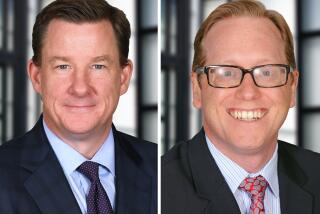Class-action backlash
- Share via
SCHADENFREUDE, THY NAME IS Milberg Weiss Bershad & Schulman. Or at least it is for much of corporate America, which has been trying to portray the indictment of the greatest practitioner of the shareholder class-action lawsuit as an indictment of the shareholder class-action lawsuit. It’s not.
Last month, Milberg Weiss and two of its partners were charged with funneling more than $11.3 million in kickbacks to a stable of morally challenged repeat clients (including a Beverly Hills eye surgeon who, after losing his medical license, committed insurance fraud by stealing a Monet and a Picasso from his own home). Milberg Weiss isn’t just any law firm. It is credited with perfecting the process of ferreting out managerial malfeasance, recruiting shareholder-plaintiffs and suing corporations for audacious amounts of money.
It isn’t the only plaintiffs’ firm to use aggressive tactics. But it is by far the best known, reaping about $45 billion in settlements on behalf of its clients over the course of more than 30 years. In its heyday, Milberg Weiss was the lead firm on close to half of all corporate class-action lawsuits. For years, lawmakers and business interests have complained, with some merit, that frivolous class-action lawsuits cost U.S. businesses billions and deliver little compensation for individual plaintiffs -- all the while spinning off huge legal fees for the lawyers who initiate them.
When carried out properly, shareholder class- action lawsuits are an important tool in the arsenal against corporate misdeeds because they let injured parties pool resources and give attorneys incentives to take their cases. The alternative approaches are equally, if not more, imperfect. Regulatory agencies don’t have the reach or the resources to handle all business oversight. And if corporate America thinks the roster of federal class-action cases is overwhelming, just imagine how vast a universe of individual plaintiffs’ suits, strewn over scores of jurisdictions, could be.
Milberg Weiss denies any wrongdoing, claiming that any payments made were legitimate referral fees for other law firms, not kickbacks to individual plaintiffs. On a website it created to defend itself, the firm notes that it helps individuals who suffer harm at the hands of faceless, well-funded corporations.
But pointing out the sunny side of the classaction game is hardly a defense of the charges in the indictment, just as the indictment is hardly a criticism of the merits of class-action suits. Which is not to say that class-action practices couldn’t benefit from meaningful reforms. When it comes to flagrant abuses like the ones alleged here, the rights of shareholders, patients and consumers are too important to be abandoned to the guardianship of trumped-up plaintiffs and the lawyers who love them.
More to Read
Inside the business of entertainment
The Wide Shot brings you news, analysis and insights on everything from streaming wars to production — and what it all means for the future.
You may occasionally receive promotional content from the Los Angeles Times.










